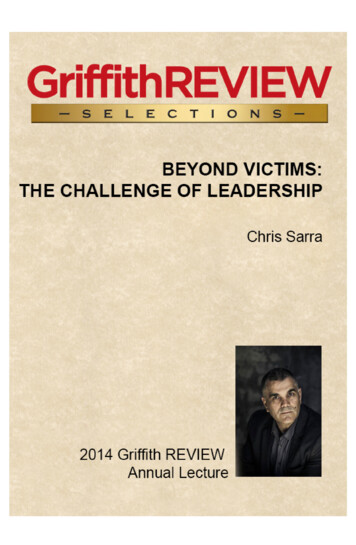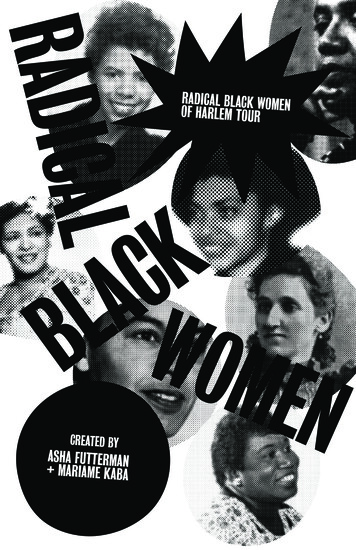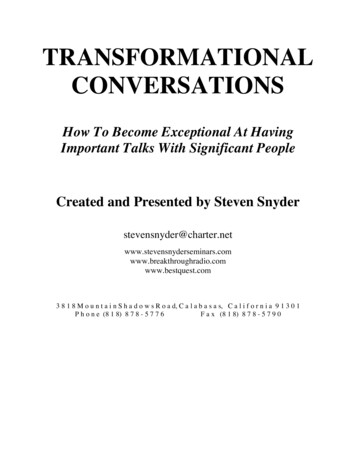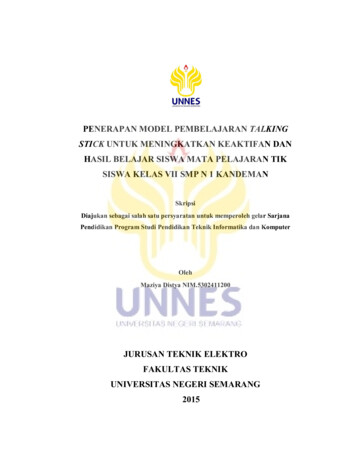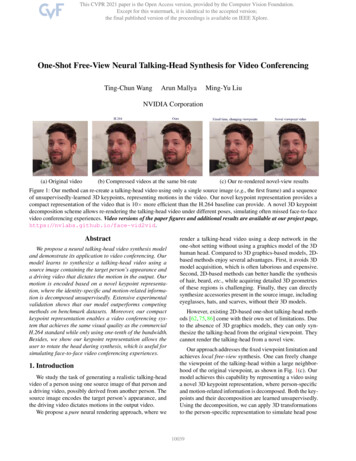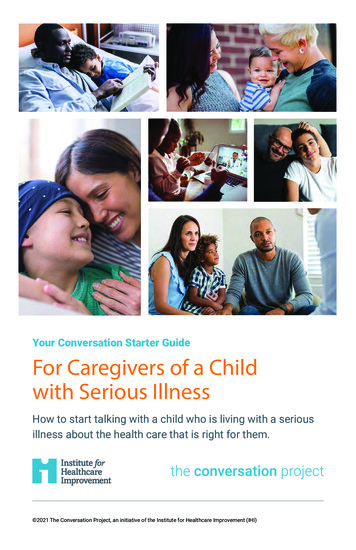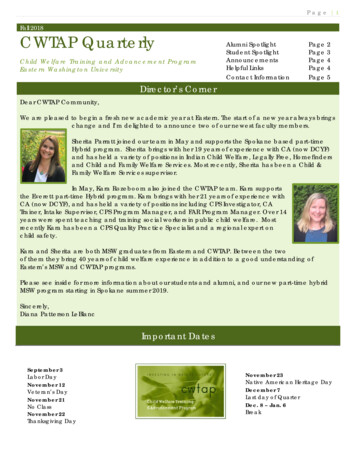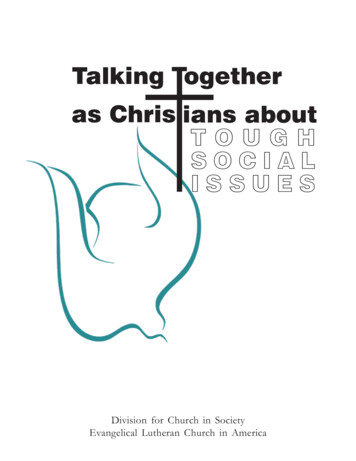
Transcription
Talking ogetheras Chris ians aboutTOUGHSOCIALISSUESDivision for Church in SocietyEvangelical Lutheran Church in America
Talking ogetheras Chris ians aboutTOUGHSOCIALISSUESCopyright August 1999, Evangelical Lutheran Church in America. Produced by the Department for Studies of theDivision for Church in Society, 8765 W. Higgins Rd., Chicago, Illinois, 60631-4190. Permission is granted to reproducethis document as needed provided each copy carries the copyright notice printed above.Scripture quotations from the New Revised Standard Version of the Bible are copyright 1989 by the Division of ChristianEducation of the National Council of Churches of Christ in the United States of America and are used by permission.Images copyright 1999 PhotoDisc, Inc.ISBN 6-0001-1197-5Distributed on behalf of the Division for Church in Society of the Evangelical Lutheran Church in America by AugsburgFortress Publishers. Augsburg Fortress order code 69-8681.Printed on recycled paper with soy-based inks.
PrefaceIn its first social statement, “The Church in Society: A Lutheran Perspective”(1991), the Evangelical Lutheran Church in America—in all its expressions—committed itself to foster moral deliberation on social questions, seeking to:zzzzzbe a community where open, passionate, and respectful deliberation onchallenging and controversial issues of contemporary society is expectedand encouraged;engage those of diverse perspectives, classes, genders, ages, races, andcultures in the deliberation process so that each of our limited horizons mightbe expanded and the witness of the Body of Christ in the world enhanced;address through deliberative processes the issues faced by the people ofGod, in order to equip them in their discipleship and citizenship in the world;arrive at positions to guide its corporate witness through participatoryprocesses of moral deliberation; andcontribute toward the up-building of the common good and the revitalizing ofpublic life through open and inclusive processes of deliberation.The 1997 ELCA Churchwide Assembly adopted seven “Initiatives to Prepare for aNew Century.” The third initiative, “Witness to God’s Action in the World,” is intendedto encourage congregations to “model life in community as they address pressingsocial issues, ethical questions, and community renewal.” Part of this includescongregations developing and exercising their skills in faith-based deliberation abouttough social issues. This guide has been written in response to that initiative. It isintended for leadership teams of pastors and lay people. Here “talking together” isused as a more accessible synonym for what has previously been referred to as“moral deliberation.”The suggestions in this guide have been gleaned from groups and organizationswith considerable experience in helping people with conversations such as these. InNovember of 1998, the Department for Studies of the Division for Church in Societyconvened a gathering of representatives of a number of these groups, some ofwhom are listed in Appendix A. We are grateful for their generous time, experience,and knowledge. You may want to contact them for further resources or assistance.If your congregation is interested in participating in additional ELCA-sponsoredtraining opportunities related to this, contact the Division for Church in Society(773-380-2716) for some special upcoming events.This resource is available for free download in PDF format at www.elca.org/dcs/talkingtogether. html, as are all the ELCA social statements and messages.Written byRev. Karen L. Bloomquist, Ph.D.Director for Studies in the ELCA Division for Church in Society and Associate Professor of Theological Ethics at Wartburg Theological Seminary, Dubuque, Iowa.Rev. Ronald W. Duty, Ph.D.Assistant Director for Studies in the ELCA Division for Church in Society.Design and artwork by David Scott.1
IntroductionMany of us yearn for help in figuring out how God and our faith relate to the issueswe encounter in our lives and society. As a church we confess that God is deeply involved in our lives and world, but figuring out how and what that means in relation tothe specific issues and questions we face is often difficult. People in many congregationsseem reluctant to talk together about such questions, especially if this will open up realdifferences among them.What isconsidered aA man left a synod workshop on gambling saying, “I sure wish“tough socialwe could talk about things like this in my church!”issue” to talkabout variesCongregational members on both sides of a hot community issuegreatly, dependgive clear indications that they don’t want to talk about it ining on whotheirchurch.people are, theirculture, theirA community is incensed over some suspected hate crimes thathistory, currenthave occurred recently and expects that the churches will talksituation, andthe usual waysand do something about this.their erprojectedtion does things.What is easy alkingtalk about in anabout what it could do to address this and other rural issues.urban settingmay not be in aSome members of an urban church want their congregation to dorural setting, borhood.vice versa. Whatis taboo in someA pastor would really like members of the congregation to discultures, such ascuss a proposed social statement, but is unsure of how to do soissues related tobecause of the potential conflict that it might raise.sex or money,may not be inothers. In somecases, people feel free to open themselves up to others—that’s part of what it means forthem to be the church! In many other cases, people are reluctant to share their feelings andviews—that feels too risky for them! They might express thoughts like those shared above.A given issue can affect some people in very different ways than it does others—due towhat they’ve experienced, where they’ve come from, and individual personality differences. Talking about these things together brings these differences out in the open, whichcan be risky.Some people fear that disagreement on an issue will divide a congregation and threatenrelationships in the congregation as well as in the wider community. That can happen, butit doesn’t necessarily have to happen. Disagreements can become destructive when congregations don’t have the attitudes, beliefs, knowledge, skills, and behavior to talk together constructively. However, if those who shape the life of a congregation give clear, reassuring signalsthat “we talk about matters like that here,” and if the congregation has developed the habitand learned practices for doing so, this begins to feel like a natural part of what it means to2
be a church. When issues arise, they must be talked about, and these congregations feelconfident that they can talk about them.Talking about social issues together from the perspective of our faith is something thatChristians can learn to do, or do better and with more spiritual depth. This resourceintroduces congregations and other church groups (such as synod groups, committees, orsocial ministry organizations) to the art of public conversation about social issues. It can alsohelp those who have experienced this already to improve their skills and practices. Ratherthan a complete training manual, it is a guide that points out some important things toremember in leading faith-based conversations about social issues. It may provide you theconfidence to begin or enhance these conversations, or you may want additional trainingand resources (see Appendix A).There is a wide range of social issues a congregation could talk about. For many people,the term “social issues” suggests things like abortion, homosexuality, racism, or sexual,physical, or emotional abuse. These are among the toughest issues to talk about publiclybecause they tap the deep feelings and values of many people, and are embarrassing formany to talk about. But there are other important issues, such as economic justice, healthcare, or the environment. They have a“I come to church to hear about spiritual matters and don’tpublic dimensionwant to hear about social issues.”but may not be asemotionally sensi“I have my own opinions and i don’t want to be upset by whattive or intenselyothersthink.”personal as someothers. Social issues“That’s too sensitive an issue to talk about here!”can also be quitelocal to particular“I have to live with these people—and that’s hard if we opencommunities, suchup topics where we’re likely to disagree.”as the closing of asmall town business, “We all think the same way in this church—there’s no need towhether a congregatalk about it!”tion should start ahealth ministry to“I don’t want people to know what i think.”reach out to itssurrounding community, or what to do about the prostitutes whose activities make life difficult for residentsof a neighborhood.Talking through tough social issues as Christians means respectful yet passionate dialogue from the perspective of the faith they share. Together they seek to understand andclarify the issue, its causes, dimensions, and consequences. They take into account theirpersonal and community experiences of the issue, as well as Scripture, church tradition andteachings, human knowledge and reason. Such dialogue helps participants discern whatthey—both personally and as communities of faith—should do with regard to this issue.This is more than a casual conversation. It is a serious dialogue about what really matters inthe life of the Christian community and in the life of the world.These conversations are public in at least two ways. First, they are part of the publicministry of a congregation. Second, these conversations often deal with important mattersof public concern outside the church. These matters are part of the congregation’s witnessin the world. Members of the wider community may be encouraged to participate in theseconversations. Through these conversations a congregation may also become more engagedwith others in the community to address what is at stake.3
Why do this as Church ?Why should we do this as church? How is this part of our calling? How is thisconnected with how God is active in our world and in our congregation? How mightthis strengthen our congregation’s mission and ministry?As the Church, we believe and proclaim that God is active in all realms of life—including the social, economic, and political. God preserves creation, orders society,and promotes justice in a broken world. Faith active in love seeking justice in the world is asingle, unified vocation of the church. God continually pulls us out of our private lives andinto the public—where we participate in a world in common with those who are differentfrom us.Luther’s conviction was that the presence of the indwelling Christ through the HolySpirit is the source of wisdom and power. The Spirit of the crucified and risen Christ, asknown in and through the Word and sacraments of the gathered Church, is the effectivepower in what the Church is and does. The Spirit makes Christ present in, with, and for usas a dynamic, experienced reality. As a relationalpower grounded in the very nature of the triuneGod, the Spirit connects us in new ways with one“Through preaching, teaching, the sacraments,another and the rest of creationScripture, and ‘mutual conversation and consolation,’ the Church is gathered and shaped by theHoly Spirit to be a serving and liberating presence inthe world” ELCA Social Statement, The Church inSociety: A Lutheran Perspective, 1991.Through the power of the Holy Spirit, we grow inunderstanding and service as we talk together aboutthe tough social dilemmas and challenges we facetoday. It isn’t always clear what we should do asChristians in these situations. When we as Christians face difficult decisions or situations in our personal lives, we often pray about them,read the Scriptures, or talk with a few trusted friends or a pastor. Likewise, when we facedifficult decisions or situations as the church, we need to pray together, read Scripturetogether, study the Christian tradition, and talk together as the church about our situationand our experiences in order to seek some guidance from the Holy Spirit.Whether we do this individually, or with others, we are practicing what the Church hascalled “spiritual discernment.” We discern together, trusting the Holy Spirit to workthrough Scriptures, Christian tradition, human reason, and our experience to speak to oursituation and guide our conversation. We trust that we might come to understand whatGod may be telling us and leading us to do, and that the Spirit will empower us to do it.“But the Holy Spirit has called me through theGospel, enlightened me with his gifts, and sanctifiedand kept me in true faith. In the same way he calls,gathers, enlightens, and sanctifies the whole Christian church on earth, and keeps it united with JesusChrist in the one true faith.”Martin Luther, The Small Chatechism, Explanationto the Third Article of the Apostle’s Creed4In this spiritual discernment, it is good to keep onpraying together, reading Scripture, and talkingtogether. The Spirit keeps us open to new thingsGod may be doing, new insights God may want usto see, and new ways in which God may calling us toserve. We also realize that our previous understandings or actions may need to be corrected.Although this way of talking about tough issues issimilar to democratic discussion or civil conversation,talking as the Church makes it different from them in
important ways. It shares with civil conversation the same commitments to mutual respectand understanding and constructive dialogue among people with points of view that maydiffer strongly.Democratic discussion or civil conversation, however, can be carried on withoutinviting or presuming the Holy Spirit to be working in the participants or in theconversation itself. The point of civil conversation is not necessarily to discern whatGod may be up to, how Scripture or Christian tradition inform the discussion, orwhat God may be calling people to understand, say, or do. But that is what talkingthrough tough social issues together as the Church is about. It is more than an just arespectful civil conversation or an exercise in democratic decision-making where themajority rules. If the point of the conversation is seeking how God may is active inthis issue, then something more than our personal opinion, feelings, or interests are atstake. Deciding and acting as the Church on tough social ethical issues, or discerningGod’s will, is more than a matter of “civility” or “majority vote.”Some Examples from the New Testament and BeyondTalking through tough issues as the Church may be new to some Christians’ experiencetoday, but it is not really new in the history of the Church. It began with Jesus’s earthlyministry as he proclaimed the Gospel and taught his disciples. Jesus’s ministry was a publicministry in which he repeatedly addressed difficult issues among crowds, with religiousauthorities, at dinner parties, or in the Temple in Jerusalem, and did so from the traditionof Moses and the prophets, the Psalms, and the Hebrew sages. For example, he argued withthe Pharisees when they complained about his disciples picking grain to eat on the Sabbath, and later continued this controversy about what was appropriate on the Sabbathwhen he healed a man’s hand in their synagogue on the Sabbath (Mark 2:23-3:6; Matthew12:1-14; Luke 6:1-11). He had a controversy with the Scribes over his eating with sinnersand tax collectors (Mark 2:13-17; Matthew 9:9-13; Luke 5:27-32). Jesus also argued with thePharisees about divorce (Mark 10:1-12; Matthew 19:1-19), and with Pharisees and thesupporters of King Herod about paying taxes (Mark 12:13-17; Matthew 22:15-22; Luke20:20-26). In the Temple in Jerusalem, Jesus was publicly confronted by those who wantedto know by what authority he was “doing these things” (Mark 11:27-33; Matthew 21:23-27;Luke 20:1-8).After Pentecost, the Church continued a pattern of talking about tough issues in public.For example, Greek-speaking Christians complained that the widows in their group wereneglected in the daily distribution of food by Hebrew-speaking Christians. This led to apublic meeting in which this situation was discussed and peacefully resolved (Acts 6:1-6).This not only addressed the needs of the women, but it was also a public witness abouthow widows ought to be treated. When Peter was called before the church in Jerusalem toexplain why he was eating with Gentiles, he explained how God was leading them to faithin Jesus and giving them the Holy Spirit. This public conversation in the council led to theacceptance of these non-Jews in the Church (Acts 11:1-18). Paul’s public ministry involvedhim in public controversy with people in his congregations. In his First Letter to theCorinthians, he engages the congregation about their internal divisions, about reports ofsexual immorality among them, about their suing one another in court, about fornication,marriage and the remarriage of widows, and public offering of food to idols by members ofthe church (I Corinthians 3:1-9:13).5
Both Jesus and Paul raisedtough issues in public from theperspective of faith. In somecases, they stood in the traditionof Israel’s prophets, who calledIsrael publicly to repent for itsidolatry and injustice toward thepoor. In other cases, they stoodin the tradition of Israel’s judges,who called for a community thatwas distinct from its neighbors.They also knew well the storiesof the people of Israel and theaccount of God giving Israel theLaw to regulate their community life. They were familiar as well with the writings of theHebrew sages on what reason teaches faithful people about how to live together as acommunity of God’s people.For additional information on ELCA public policyadvocacy, contact the Lutheran Office for Governmental Affairs (LOGA) at 202-783-7507 or by e-mail atloga@ecunet.org, or your Lutheran Public PolicyOffice—LOGA can tell you if there is one in your state.Centuries later, Martin Luther regularly engagedpublic issues—such as those concerning schools,soldiers, and trade, as well as the relationships amongpowerful public leaders and poor peasants. Drawingon this tradition, 20th century Lutherans in the U.S.have addressed a range of tough and importantpublic issues in national life by means of publicstatements as well as though advocacy in Congress,state legislatures, and in their local communities.Getting OrganizedCongregations and other faith groups need a group of leaders to helpthem get organized and have good faith-based conversations. Between twoand six lay people and a pastor will be enough for most congregations.These leaders need not, though they may, be the elected leaders of thecongregation or group. Each member of the leadership team shouldhave a copy of this guide.While in some congregations this leadership group may want to organize conversations as special events, consider using existing occasions or groups. Bible studygroups, confirmation classes, youth groups, service or fellowship groups, immigration or literacy groups, women’s circles, men’s organizations, adult instructionclasses, and other ongoing groups in a congregation can all be occasions for holdingconversations about issues that may be of vital interest to their members. Leadership teams decide what will work best in a given congregation. Even in congregations serving relatively transient groups, watch for some opportunities to engagepeople in conversation about issues of direct relevance to them.6
Lay people should usually take the lead in a leadership group. Parish pastors or otherprofessional leaders are most helpful and effective when they support, coach, and encourage lay people to take public leadership. They can also find other ways to serve the conversation. For example, pastors have valuable knowledge about church teaching, history, andScripture, as well as what the church has said recently about various social issues. Occasionally they may serve effectively as public leaders of dialogue along with lay people, or whenstrong lay leadership is unavailable. Normally, however, the development of skilled layleadership is necessary to help make this a regular part of church life and ministry. Then,when pastors move on, skilled lay leaders are able to continue leading such conversations.Pastors are key people in helping strong lay leadership to develop.Leaders are responsible for:zzzzzzzzGood leaders for faith-based conversation arethose most people trust, who are known both asgood listeners and are seen to be fair, and peoplewho are interested in helping people talk aboutthings from the perspective of their faith.identifying a topic for discussion;making appropriate arrangements for a timeand place to meet;inviting people to the conversation throughpublicity and personal contact (personal contacts will be occasions to listen topeople’s needs and concerns about the conversation);building relationships with people that will help the conversation;identifying any problems that need to be addressed to help good conversationhappen;holding each other accountable for tasks tobe done;organizing the format and structure for themeeting; andLeaders will be most effective whenhelping to conduct the conversationsthey see their roles as serving thethemselves.conversation, whatever the particularroles they may play.Choosing a Topic for DialogueThe choice of a conversation topic will be influenced by several key considerations.Normally topics will reflect important issues that the congregation or its community arefacing, or issues in which potential participants are interested. Sometimes these issues are sourgent that they cannot be avoided. For congregations just beginning to learn to talkthrough tough issues together, start with an issue that is not too difficult or complex (unlessyou cannot avoid it). With a less controversial and emotionally-charged issue, the congregation can more easily learn the skills and master the behavior for talking through toughissues together. This can also build some confidence in its abilities to tackle much tougherissues. When that time comes, the congregation will already have some skills and positiveexperience of talking about issues upon which to draw.In planning for actual conversation, your group will need to decide whether the topicor the intended conversation partners need a one-time occasion or a series of meetings totalk through the issue. When and where conversations are held are determined by verypractical considerations. Some congregations have had success holding conversations onSunday mornings during their education period. This works well for a group where theparticipants know one another, have a basic level of trust, and are used to interacting.7
However, on some topics, even for groups ofpeople that are familiar with one another, it takesabout 90 minutes for the conversation to start to“Even for groups of people that are“flow” or “float.” This means that after about thislength of time they become less self-conscious, sofamiliar with one another, it oftenthat the conversation takes on a life of its own andtakes about 90 minutes for the constarts to go somewhere. You may need this muchversation to start to ‘flow’ or ‘float.’”time to begin to have a significant conversation thatmeets the hopes and expectations of the participants.You may need to hold your conversations at a timeother than Sunday morning if you want enough time for a deep conversation. On theother hand, when you are just beginning to help your congregation learn these skills, itmay be easier to gather a group at a time they are used to being at church, such as Sundaymorning. You need to hold conversations when people are able to gather together.Giving an Effective Invitation to Talk TogetherChristians need an effective invitation to talk, one that makes them feel comfortable andsafe in sharing their views with others. This will vary from group to group and dependupon their context and past experiences. Church often has not been a safe place to talk;people in many congregations have some painful memories of experiences which makethem anxious about having public conversation in a congregation or a group. They alsohave other memories which make them more hopeful about having such conversations inthe future. When you organize a conversation, appeal to these more hopeful memories andlet people know in every way possible that efforts will be made to make this a “safe place”to talk.Congregations are safe places to talk through social issues when there is a true desire tolisten to others, even when some people do not agree with them or when what they have tosay is painful to hear. They are also safe places when there is genuine respect for all participants in the conversation and people are not put down, either for who they are or whatthey say. Their integrity is not put in question. Congregations are safe when people are freeto speak their minds and hearts without negative consequences later.The Purpose of the ConversationAn important purpose of our conversations is to enrich our understandings and try todiscern how God is acting and calling us to act on this issue without the expectation that allin the group will necessarily come to the same position, and also to build relationships andtrust among the participants. Through these conversations, we can find or broaden areas ofagreement and clarify areas of disagreement. Even with what seem like disagreements,probe beneath the surface to see why they are there and if they are as wide as they appear.Making a decision or reaching a consensus is something that the group can do later if theywant to.Another purpose of some conversations—especially when some decision needs to bemade—is to arrive at a position or plan of action that the group as a whole can support, orat least go along with. Here persuasion becomes more important and the main focus is onthe deciding and acting together.8
The Actual InvitingzzBe clear about the purposes of the conversation and about why they are invited.Target as much publicity to the intendedparticipants as practical. It helps to raiseawareness of the event.Picture two or more people engaged in conversation on the street, in a coffee shop, tavern, or othergathering spot . . . or a circle of family or friends in ahome . . . or people talking together at a retreat orother “place away” from their normal life. Why dothey want to talk together? What makes them willing,even eager to share what’s on their minds?Give a realistic picture aboutwhat people can expect; hereare some suggestions:zdescribe what it will be likein oral invitations and/orwritten announcements such asnewsletters;talk to potential participantspersonally aboutwhat youexpect it will be like;demonstrate or role play aconversation like the one youwant them to take part in;listen carefully and respondto the concerns they haveabout participating;ask them what will make suchexperience feel “safe” for themto express themselves; andstress that people may learnnew skills.{{{{{zzzzzzShow them a list of proposed ground rulesfor the conversation such as the one on thenext page.Emphasize that everyone’s views need to beheard.Invite them to listen to the views andfeelings of others.Encourage people to express how they viewor feel about the topic being considered.Stress that as we communicate with otherswe may realize how the power of the HolySpirit enables us to hear and understandwhat we would not on our own. Ourtalking with one another can becomeanother Pentecost miracle of communication that transforms the Church (us!) in theprocess.Extend hospitality by offering food, childcare, and/or transportation.{How to invite people to a genuine conversation:zzzzzzChoose a topic in which potential participantsalready have an interest in.State the topic in a way that is not undulybiased in favor of one position.Designate or find neutral or trusted persons todo the inviting.Invite people personally; it helps if more thanone person encourages someone to come.Seek out persons with different life experiences,perspectives, and vested interests in the topic;recruit enough from each perspective so that noone will feel outnumbered or “set up.”Make a persuasive case for why they wouldwant to participate and how they will grow intheir understanding, skills, and ability to respondto this issue in their life and in God’s world.9
Ground Rules for ConversationTo fulfill the hopes people have for conversation in their congregation, and to lessentheir anxieties and fears about it, certain ground rules for conversation are helpful. Thesewill help to build trust among participants and create a safe space in which good conversation is possible.The purpose of this honest sharingis to open up discussion of thingsthat need attention, rather than toclose off discussion.Follow the Golden Rule: “Do unto others as youwould have them do unto you”—even when youdisagree with them.Listen respectfully and carefully to others. Thisis your best way to begin to understand them. Thisalso helps keep the “public space” of this conversation safe for candid conversation. By listeningcarefully to others, you help to build relationships of trust. You also move beyond ourprivate feelings and thoughts to public space where it feels safe to share your differences,and where you can probe for values and positions that you hold in common.Speak honestly about your thoughts and feelings. Honesty about your thoughts andfeelings expresses respect for others. Personal thoughts, feelings, values, and experiences areas legitimate a part of the conversation as factual information. Conversation can be quitepassionate and still be respectful, civil, and constructive.Speak for yourself, rather than as a member of a group.
seem reluctant to talk together about such questions, especially if this will open up real differences among them. What is considered a "tough social issue" to talk about varies greatly, depend-ing on who people are, their culture, their history, current situation, and the usual ways their congrega-tion does things. What is easy to talk .


